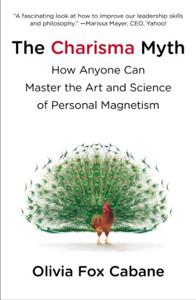
Want to learn the ideas in The Charisma Myth better than ever? Read the world’s #1 book summary of The Charisma Myth by Olivia Cabane, Lisa Cordileone here.
Read a brief 1-Page Summary or watch video summaries curated by our expert team. Note: this book guide is not affiliated with or endorsed by the publisher or author, and we always encourage you to purchase and read the full book.
Video Summaries of The Charisma Myth
We’ve scoured the Internet for the very best videos on The Charisma Myth, from high-quality videos summaries to interviews or commentary by Olivia Cabane, Lisa Cordileone.
1-Page Summary of The Charisma Myth
Overview
The Charisma Myth by Olivia Fox Cabane is a book that teaches people how to be more charismatic in their personal and professional lives. The stereotype is that you’re either born with charisma or not, but it can be learned through certain skills such as body language, voice control, etc.
Charisma is communicated through conversation and body language. It is identified with power, warmth, and presence. Those traits come from four different personality types: focus charisma (which comes from being passionate about a topic), vision charisma (which comes from having an optimistic view of the future), kindness charisma (which comes from caring for others’ needs), and authority charisma (which comes from taking charge). Internal obstacles can undermine one’s charismatic demeanor, but overcoming those obstacles requires resolving physical discomfort by changing perspective in order to reduce anxiety and doubt.
Some people are not naturally charming. But, they can behave like charismatic people by mimicking their body language and conversational habits. This is because the brain can be tricked into behaving in a more charming way. If you pause before answering questions, maintain eye contact while listening, take a wide stance and show compassion to others, then you will become more charismatic. A first impression that’s perceived as charismatic can create long-term benefits due to approval from others.
There are some downsides to having charisma, such as incurring envy from others or accidentally earning too much trust and then over-sharing. These can be prevented with various strategies.
Key Takeaways
Charisma is a skill that can be developed, but it requires willpower. Charismatic people exude presence, warmth, and power. The internal state of mind enables body language to communicate those traits to others. Pretending to have charisma achieves the same results as having it.
Anxiety, self-doubt and discomfort can make you less charismatic. You can reduce this by doing exercises that change your perception of reality. Practice makes perfect when it comes to charisma, so developing a mental outlook conducive to conveying charisma is important.
There are several different types of charisma. The most important ones are focus charisma, visionary charisma, kindness charisma, and authority charisma. They each create a different reaction in others and require a unique set of cues to utilize effectively.
Charismatic people make a good first impression on others. This can lead to long-term impressions of trustworthiness and effectiveness. To convey charisma in a conversation, you should listen more than speak.
A charismatic person can make a difficult conversation more pleasant. He or she can also help to smooth interactions with difficult people. Here are some strategies for making your presentation more charismatic: encourage the audience to ask questions, dress comfortably, rehearse, maintain a powerful stance, project warm compassion and breathe comfortably while slowing down.
To be charismatic during a crisis, people should remain calm and confident. They should express their vision for the future without hesitation.
Charismatic people can be dangerous, because others rely on them too much.
Key Takeaway 1: Charisma is the ability to attract attention and admiration from others. It is a skill that can be developed, but requires willpower that can be depleted.
Charismatic people are good at influencing others, making friends and achieving their goals. They can convince others to accept their ideas and help them achieve success. Charisma is a skill that can be learned by anyone, although it requires effort to activate it.





